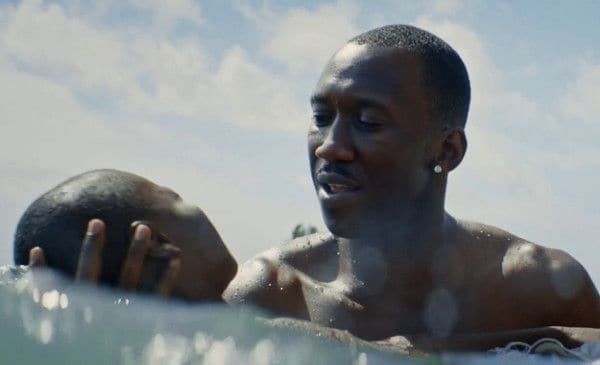Eye For Film >> Movies >> Moonlight (2016) Film Review
Moonlight
Reviewed by: Amber Wilkinson

The nature of identity, not only the way that it is formed but how it can shift and shimmer and the way that we present it to others, lies at the heart of Barry Jenkins' film. Like Celine Sciamma's similarly impressive Girlhood, this is a story not simply about who its protagonist is in terms of his essential nature, but also about who he might become as life experience shapes him and as he chooses the elements of his personality he wishes to nurture.
Presented as a triptych, we see three faces of Chiron - one as a nine-year-old, the second as a teenager and a third at that sweet spot in early adulthood when, although we are physically fully grown, our personality enjoys a fledgling moment before we take off, in all likelihood, in a single direction for life. If this structure, and the fact that the story is loosely adapted from Tarell Alvin McCraney's play In Moonlight Black Boys Look Blue, makes the film sound rigid, the end result is anything but. Jenkins refuses to let his ideas or his characters become boxed in, so that both their essence and their ability to change flow from one part of his screenplay to the next.

Jenkins doesn't just show us the experience of his young protagonist, he bathes us in it, with the camera plunging us straight into the moment from the very first. One minute we're feeling the agitation of a drug dealer, being circled by his boss Juan (Mahershala Ali), the camera joining the spin, the next we're thrust into Chiron's world, running fast with him through tall grass. For a second, it's exhilarating, then we realise it's a flight of fear, as he runs from bullies into an abandoned crack den, the sound of missiles lobbed at its windows a cacophony of noise. We don't merely see Chiron's anxiety, we feel it like a kindred spirit, and are as nervous and wary as he is when Juan seems to offer him the hand of friendship.
Jenkins keeps us in the moment by wrong-footing our expectations. The world is full of African-American clichés but Jenkins lifts the cloak to show the multi-faceted reality. Juan is a long way from the harsh groomer we first imagined, glimmers of his own beaten-by-experience personality glinting from beneath the tough exterior as he takes Chiron under his wing, instructs him on how to protect himself ("never sit with your back to a door") and tells Chiron it’s okay to be whoever he wants to be, whenever that moment comes.
Jenkins perfectly captures the way that children can have a sense for 'difference' if it might also equal 'weakness' even if they don't have a name for what that difference might be. Is Chiron gay? It's a big question for a little guy and one that he is still grappling with in his teens, as he morphs into a gangly youth. His marginal background gives little scope for sitting around considering inner conflict as, in yet another graceful arc, we watch his bright and fierce mother Paula (Naomie Harris) slide inexorably into drug addiction.
Chiron's homelife is, at best chaotic, and Jenkins neither shies away from nor wallows in the darkness. Instead he offers moments of counterpoint, such as a first sexual encounter on a beach that washes over us like the waves we can hear in the background, its complex emotions as myriad as the grains of sand beneath Chiron's hand. By the time we see Chiron next, he is physically fully formed, complete with ripped torso and gold grillz, but we soon see that the identity he is putting on display for the world, is just one aspect of something much more complex.
The triptych nature of the film means that it will be hard for Oscar to single them out but any of the three incarnations of Chiron is worth an acting prize. From the glimmers of sweetness that Alex Hibbert brings to the uncertain youngster, nicknamed Little, to Ashton Sanders revelatory moments as a brooding teen and, in particular, Trevante Rhodes as the adult known as Black, who retains essential body language from the earlier portrayals. Jenkins does more than pour his energy into the central figure, crafting all the supporting roles with care. Ali helps to show the humanity of Juan but, though less surprising in terms of character, André Holland also deserves high praise for his delicate portrayal of Chiron’s friend Kevin.
It would also be easy for the scoring to go unnoticed, so carefully does Nicholas Britell use music to enhance the mood, but it, like so much of Jenkins' imagery, features beautiful moments, such as when Chiron is a teen, we hear what sounds like the tuning up of an orchestra, the perfect accompaniment to a sequence of events which can surely only be the start of something.
It’s almost a year since the #Oscarssowhite controversy hit the headlines but though this film is about a very specific experience of growing up black and gay in America – and deserves plaudits for that – it is also about much more than that, from the way socio-economics affects us to the complexities of masculinity to finding your place in the world and understanding that change is part of life. Jenkins doesn’t just let us walk a mile in Chiron’s shoes, he invites us to step into his soul.
Reviewed on: 07 Jan 2017
















